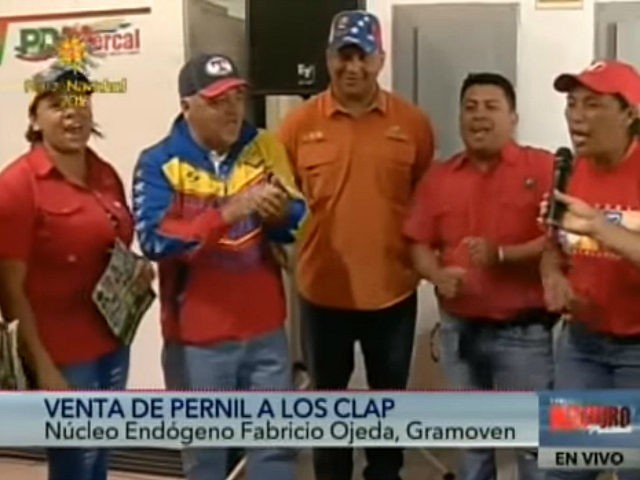On the latest edition of In Contact with Maduro, Venezuelan President Nicolás Maduro’s television show, the socialist food distribution groups known as the CLAP debuted a personalized Christmas carol celebrating Maduro’s decision to allow Venezuelans to use 100 bolívar bills through January.
“Knock knock – who is it? We are the CLAP!” the song begins, sung to the tune of another Bolivarian Christmas classic, “Knock Knock – Who Is It? People Of Peace, Lower Those Prices, Nicolás [Maduro] Is Here,” itself an adaptation of a classic Venezuelan Christmas carol.
The Local Committees for Supply and Production (CLAP) are food distribution brigades made up of local Socialist Party members, who receive full discretion from Caracas to distribute food supplies in their communities as they see fit. Implemented over the summer as Venezuela’s growing famine reached new depths, opposition members protested that giving the Socialist Party control of food was an easy way for the government to strong-arm political dissidents into submission. Maduro himself did not disagree, referring to the CLAP as a “great instrument of the Revolution to win the economic war” at the time.
CLAP members appeared on In Contact with Maduro last week to sing their song. The song, which Venezuelan state propaganda regaled as having “impacted [the people] with its brevity and joy,” is reportedly intended “for the abusers of Venezuelan bills who abducted paper currency in a perverse plan to ruin Christmas.”
“Knock knock — who is it? We are the CLAP; open the door for us, Christmas is here!” the group sings. “Look bachaqueros, go off and running; because we have 100 bills until the month of January.”
The rest of In Contact followed its typical format: extended speeches from Maduro, promises of luxury items such as rice, meat, and flour for viewers, and a toy giveaway featuring some of the four million toys Maduro’s government stole from private manufacturers earlier in the month to use in such Christmas giveaways. In previous attempts to attack the anti-socialist opposition during the holiday season, Maduro had accused opponents of being “Grinches” who “want to steal Christmas.”
Maduro has also, as he did this year, imposed “sales” on private businesses so that poor Venezuelans can afford to buy gifts. Many of these variety stores no longer carry such items as “socialist Barbie” (a Barbie the government forces stores to sell at 10 percent of retail value) for the same reason they no longer carry food, so families are forced to rely on government largess for their child’s presents.
In addition to Maduro’s Christmas episode of In Contact, other prominent socialist leaders like Socialist Party second-in-command Diosdado Cabello issued messages wishing Venezuelans a “Bolivarian and Revolutionary Christmas”:
.@dcabellor: "Que viva la Navidad Bolivariana, la Navidad Revolucionaria!!!!" @ConElMazoDando @AduanaPtocabell @Jm_rojas22 pic.twitter.com/KG54XlQKlB
— APPC-CA Maria Gomez (@AppcMaria) December 8, 2016
Various Venezuelan government defectors have accused Cabello of running the Cartel de los Soles, a cocaine-trafficking operation active throughout the Western Hemisphere, though Cabello has denied the allegations.
Venezuela enters Christmas week in arguably its worst condition since Maduro took power following the death of dictator Hugo Chávez in 2013. Maduro exacerbated the difficulties Venezuelans suffer in purchasing food and finding necessary goods by announcing earlier this month that the nation’s banks would rescind the highest denomination bill available, the 100 bolívar, and replace it with a set of new bills ranging in value from 500 to 20,000 bolívars. Last week, Maduro outlawed the use of the 100 and ordered Venezuelans to return them in exchange for new currency. Upon doing so, however, Venezuelans did not receive the alternative currency back, as the government had not yet printed it, rendering their money worthless.
Maduro announced over the weekend that he would allow the use of 100 bolívar bills through January to handle the delay in printing the new money, blaming a conspiratorial “they” for thwarting the printing on In Contact.

COMMENTS
Please let us know if you're having issues with commenting.